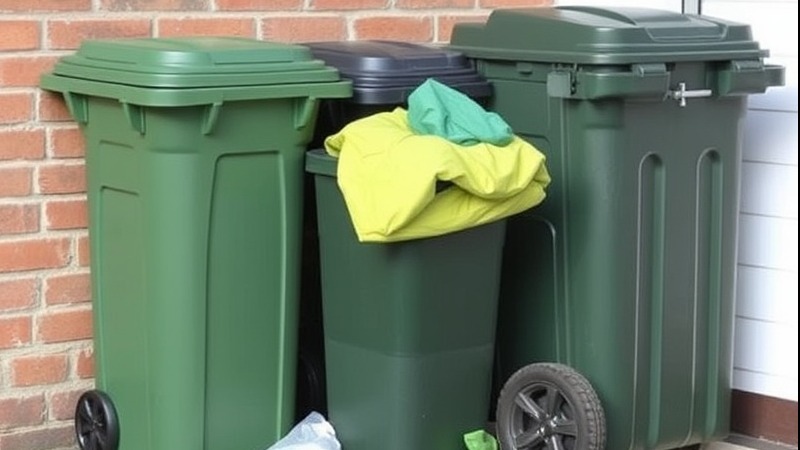
Starting a Trash Can Cleaning Business: Your Ultimate Guide to Success in 2025
Starting a trash can cleaning business can be a highly profitable venture with low barriers to entry. With growing awareness about cleanliness and hygiene, the demand for garbage can cleaning services is on the rise, making this an ideal time to dive into this niche. This comprehensive guide will help you understand the key steps, strategies, and tools required to launch and run a successful trash bin cleaning business.
Why Start a Trash Can Cleaning Business?
The trash bin cleaning industry is booming due to increased awareness about the benefits of maintaining clean and odor-free garbage bins. This business offers:
Low Startup Costs: You can begin with minimal investment, especially if you start small by focusing on residential customers and upgrade your equipment over time.
High Demand: Both homeowners and businesses recognize the importance of clean garbage cans to prevent pests, foul odors, and bacterial growth.
Flexibility: You can operate this business part-time or full-time, making it an ideal opportunity for entrepreneurs seeking a balance between work and lifestyle.
Profitability: The market potential for trash cleaning is immense. With recurring service plans and add-ons like commercial cleaning, you can scale your revenue quickly.
Steps to Start Your Trash Can Cleaning Business
1. Research and Identify Market Demand
Before launching your business, it’s critical to identify demand for trash cleaning services in your area. Consider these steps:
Analyze demographics: Urban and suburban areas with dense populations typically have higher demand for garbage can cleaning services.
Understand customer pain points: Many homeowners struggle with maintaining their garbage bins due to limited tools or time. Highlight these issues in your marketing.
Check competition: Research existing trash can cleaning companies in your region. What services do they offer? What are their prices? Identify gaps you can fill, such as eco-friendly solutions or same-day services.
Additionally, connect with local waste management companies to gauge demand trends and learn about potential partnerships.
2. Build a Solid Business Plan
A well-structured business plan is critical for success. It serves as a roadmap for your business and helps you secure funding if needed. Key components include:
Startup Costs: Estimate your initial expenses, such as equipment, vehicle modifications, insurance, and marketing.
Revenue Projections: Calculate potential income based on the average price per bin and the number of customers you can serve weekly.
Target Audience: Define whether you’ll focus on residential customers, commercial clients, or both.
Growth Strategy: Include plans for scaling your operations, such as hiring staff or expanding to nearby towns.
Use tools like LivePlan or the Small Business Administration's resources to create a detailed, professional business plan.
3. Register Your Business
Legalizing your business protects you from liabilities and ensures compliance with local regulations. Follow these steps:
Choose a Business Structure: Most small businesses start as sole proprietorships or LLCs. An LLC offers tax flexibility and personal liability protection.
Name Your Business: Pick a memorable and professional name, such as "Sparkling Bins" or "Blazing Clean Cans."
Obtain Permits: Some areas require special permits for handling water runoff or using high-pressure cleaning systems. Check with your local government.
Business Insurance: Invest in general liability insurance to cover accidents or damage during operations.
4. Invest in the Right Equipment
Your choice of equipment directly affects the quality and efficiency of your service. Essential items include:
Pressure Wash Systems: Invest in a system that can generate at least 2000 PSI for deep cleaning. Hot water systems are particularly effective for removing grease and odors.
Water Tanks: Opt for tanks with sufficient capacity to clean multiple bins per trip. Portable tanks are ideal for residential routes.
Bin Lifting Mechanisms: These can significantly reduce labor and speed up operations, particularly for commercial clients with larger bins.
Vehicle Modifications: A dual-bin flatbed setup is perfect for handling multiple bins efficiently.
To minimize costs, consider leasing equipment or purchasing used systems from reputable suppliers.
5. Set Competitive Pricing
Price your services carefully to attract customers while maintaining profitability. Consider these factors:
Market Rates: Research what competitors charge for single-bin and additional-bin cleaning.
Service Frequency: Offer discounts for regular customers who opt for monthly or bi-weekly cleanings.
Additional Services: Charge extra for deep cleaning, deodorizing, or special commercial services.
For example, you might offer packages such as:
Basic Clean: $15 per bin.
Premium Package: $20 per bin, including deodorizing and pest repellent.
Transparent pricing builds trust, so avoid hidden fees or surprise charges.
6. Create a Marketing Strategy
Effective marketing ensures a steady stream of customers. Consider these methods:
Social Media: Share engaging content on platforms like Facebook and Instagram, including cleaning videos and customer testimonials.
Google My Business: Optimize your profile with accurate contact information, high-quality images, and positive reviews. Regularly update it to reflect seasonal promotions or new services.
Local Partnerships: Collaborate with local businesses, such as real estate agents or moving companies, to reach new homeowners who need your services.
Email Campaigns: Build a list of leads and send them regular updates, discounts, and helpful tips.
Online Ads: Invest in Facebook and Google Ads targeting specific demographics, such as suburban homeowners or business owners in your service area.
Here are five more marketing ideas to enhance your strategy:
Community Involvement: Sponsor local events or host a free "Community Clean Bin Day" to introduce your service to potential customers and build goodwill.
Referral Programs: Offer discounts or free services to customers who refer friends and family. For example, "Refer a friend and get 20% off your next cleaning!"
Neighborhood Flyers: Distribute door-to-door flyers in targeted neighborhoods, showcasing before-and-after cleaning photos and your contact information.
Seasonal Promotions: Run limited-time discounts during specific times of the year, such as spring cleaning or post-holiday deals, to encourage new sign-ups.
Loyalty Rewards: Implement a program where customers earn points or discounts for repeat cleanings. For example, "Get a free cleaning after five visits!"
These additional marketing tactics will help you connect with potential clients across different touchpoints, build a loyal customer base, and boost word-of-mouth referrals.
7. Schedule and Route Planning
Efficient scheduling saves time and reduces fuel costs. Use route optimization tools like Routific or Jobber to:
Cluster appointments by neighborhood.
Minimize drive time between stops.
Allow for flexibility in case of last-minute bookings.
Automating your scheduling process improves customer satisfaction and ensures timely service.
How to Stand Out in the Garbage Can Cleaning Industry
1. Deliver Exceptional Customer Service
Quality service differentiates your business. Go the extra mile by:
Sending reminders before scheduled cleanings.
Offering free bin deodorizing for first-time customers.
Responding promptly to customer inquiries.
Encourage satisfied customers to leave positive reviews on platforms like Google or Yelp to boost your reputation.
2. Create a Memorable Brand
A strong brand identity builds trust and recognition. Tips for branding include:
Professional Logo: Design a logo that conveys cleanliness and reliability.
Uniforms: Provide your team with branded uniforms to reinforce your professionalism.
Website: Build a user-friendly website with online booking capabilities and service descriptions.
3. Offer Customized Packages
To cater to diverse customers, create flexible packages:
Residential Plans: Monthly or quarterly cleaning options for individual homes.
Commercial Packages: Weekly or bi-weekly cleaning for businesses with high trash turnover.
Eco-Friendly Options: Use biodegradable detergents to appeal to environmentally conscious clients.
FAQs About Trash Can Cleaning Businesses
Can You Make Money Cleaning Garbage Cans?
Yes, with consistent effort, this business can be highly lucrative. Recurring customers and scalable operations help generate steady income.
How Much Does It Cost to Start a Garbage Bin Cleaning Business?

Costs vary but typically include $10,000–$50,000 for equipment, vehicle modifications, and marketing.
Is Bin Cleaning Profitable?
With proper pricing and customer retention, bin cleaning yields high profit margins. Serving commercial clients can further boost revenue.
How Much Do Wash Bins Charge?
Rates generally range from $10–$20 per bin, depending on location and service offerings.
Final Thoughts
Launching a garbage can cleaning business in 2024 presents a rewarding opportunity. By focusing on exceptional customer service, leveraging technology, and implementing smart marketing strategies, you can build a thriving enterprise. Get started today and turn dirty bins into sparkling profits!
 Add Row
Add Row  Add
Add 

 Add Row
Add Row  Add
Add 



Write A Comment